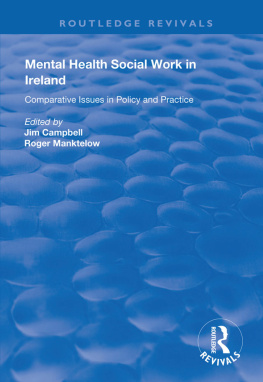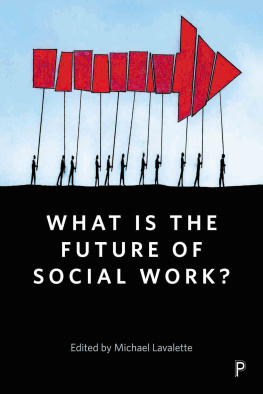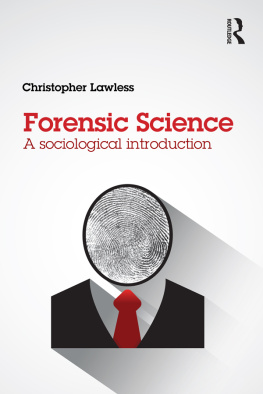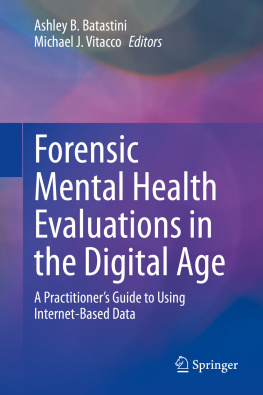This book gives full recognition that people who offend against the law often do so because of a myriad of individual and social problems, and in careful, thoughtful and insightful fashion the authors give attention to the need for better links between mental health, welfare and criminal justice systems. The contributors question and challenge received wisdom, law and policy in relation to people who offend, and set out a new paradigm for effective work between forensic mental health and human support services. This is an excellent, authoritative and thought-provoking collection of essays.
Loraine Gelsthorpe, Institute of Criminology, University of Cambridge and
President of the British Society of Criminology, UK
Practitioners, policymakers and researchers will all find this book valuable. The editors of this text define forensic mental health matters broadly and have assembled an international, interdisciplinary team of contributors. What results is a sharing of perspectives, paradigms and strategies that is unmatched by any other publication devoted to forensic mental health administration, policy and practice.
Randy K. Otto, Associate Professor, Departments of Mental Health Law and
Policy, Psychology, and Criminology, University of South Florida, USA
Working within the Forensic Paradigm
Forensic work occurs across the criminal justice sector and the legal and health professions and intersects with work in a range of areas, such as child protection, family welfare, mental health, offending, disability, addictions, family violence programmes, juvenile justice and sexual assault centres. This book offers contemporary perspectives on forensic policy and practice from the range of practitioners working with people within the forensic domain and canvasses ideas about risk and offending behaviours together with ideas about effective responses to rehabilitation and recovery.
The contributors to this book are drawn from the practitioners, policy contributors, advocates and researchers in mental health, welfare, law, criminology, policing and health. Negligible attention has been paid to forensic policy and practice; this book offers crossnational attention to how mental health, welfare and justice systems intersect, who they affect, and how practitioners structure effective responses for vulnerable people within the forensic domain.
A particular strength of the book is its international focus, making it relevant to academics and practitioners who work in this field around the world.
Rosemary Sheehan is Associate Professor in the Department of Social Work, Monash University, Australia. Her published research has looked at child welfare and the law, mental health and judicial and corrections responses to offenders, with particular reference to women offenders. Her recent research developed a specialist list project in the Childrens Court of Victoria to hear matters involving child sexual abuse; she recently completed a major study of women exiting prison.
James Ogloff is the Professor and Director of Forensic Behavioural Science at Swinburne University and Director of Psychological Services and Research at the Victorian Institute of Forensic Mental Health (Forensicare). He is trained as a psychologist and lawyer, a Fellow of the Canadian, American and Australian psychological societies. His research addresses violence risk prediction, psychopathy and jury decision-making, and long-term outcomes for children who have been sexually abused.
Routledge Frontiers of Criminal Justice
Sex Offenders: Punish, Help, Change or Control?
Theory, policy and practice explored
Edited by Jo Brayford, Francis Cowe and John Deering
Building Justice in Post-Transition Europe
Processes of criminalisation within Central and Eastern European societies
Edited by Kay Goodall, Margaret Malloch and Bill Munro
Technocrime, Policing and Surveillance
Edited by Stphane Leman-Langlois
Youth Justice in Context
Community, compliance and young people
Mairead Seymour
Women, Punishment and Social Justice
Human rights and penal practices
Margaret Malloch and Gill McIvor
Handbook of Policing, Ethics and Professional Standards
Edited by Allyson MacVean, Peter Spindler and Charlotte Solf
Contrasts in Punishment
An explanation of Anglophone excess and Nordic exceptionalism
John Pratt and Anna Eriksson
Victims of Environmental Harm
Rights, recognition and redress under national and international law
Matthew Hall
Doing Probation Work
Identity in a criminal justice occupation
Rob C. Mawby and Anne Worrall
Justice Reinvestment
Can the criminal justice system deliver more for less?
Chris Fox, Kevin Albertson and Kevin Wong
Epidemiological Criminology
Theory to practice
Edited by Eve Waltermaurer and Timothy A. Akers
Policing Cities
Urban securitization and regulation in a 21st century world
Edited by Randy K. Lippert and Kevin Walby
Restorative Justice in Transition
Kerry Clamp
International Perspectives on Police Education and Training
Edited by Perry Stanislas
Understanding Penal Practice
Edited by Ioan Durnescu and Fergus McNeill
Perceptions of Criminal Justice
Vicky De Mesmaecker
Transforming Criminal Justice?
Problem-solving and court specialization
Jane Donoghue
Policing in Taiwan
From authoritarianism to democracy
Liqun Cao, Lanying Huang and Ivan Y. Sun
Reparation for Victims of Crimes against Humanity
The healing role of reparation
Edited by Jo-Anne M. Wemmers
Victims of Violence and Restorative Practices
Finding a voice
Tinneke Van Camp
Long-Term Imprisonment and Human Rights
Edited by Kirstin Drenkhahn, Manuela Dudeck and Frieder Dnkel
Working within the Forensic Paradigm
Cross-discipline approaches for policy and practice
Edited by Rosemary Sheehan and James Ogloff
First published 2015
by Routledge
2 Park Square, Milton Park, Abingdon, Oxon OX14 4RN
and by Routledge
711 Third Avenue, New York, NY 10017
Routledge is an imprint of the Taylor & Francis Group, an informa business
2015 selection and editorial matter, Rosemary Sheehan and James
Ogloff; individual chapters, the contributors.
The right of the editors to be identified as the authors of the editorial matter, and of the authors for their individual chapters, has been asserted in accordance with sections 77 and 78 of the Copyright, Designs and Patents Act 1988.
All rights reserved. No part of this book may be reprinted or reproduced or utilised in any form or by any electronic, mechanical, or other means, now known or hereafter invented, including photocopying and recording, or in any information storage or retrieval system, without permission in writing from the publishers.
Trademark notice: Product or corporate names may be trademarks or registered trademarks, and are used only for identification and explanation without intent to infringe.





